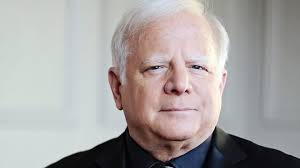People in the News
'What Happened to My Kennedy Center?'
 It was a hastily arranged marriage. The National Symphony Orchestra was looking for a new music director, and after André Previn turned down the job offer, I was approached. My relationship with the ensemble was minimal at that point in 1995, so a concert was organized at the last minute to see if we could work well together.
It was a hastily arranged marriage. The National Symphony Orchestra was looking for a new music director, and after André Previn turned down the job offer, I was approached. My relationship with the ensemble was minimal at that point in 1995, so a concert was organized at the last minute to see if we could work well together.
At the intermission, then Chairman of the Board James Wolfensohn came to my dressing room and told me that some people wanted to visit me. Moments later, President Bill Clinton and family came in. I was stunned, to say the least.
The President said, “I hope you will become a part of the Washington arts world and lead this orchestra into the future.”
Who was I to turn down such an invitation?
Thus began a 12-year relationship with the Kennedy Center, the people of Washington D.C., and beyond.
The Center was a safe space for artists and audiences. No one felt threatened or under the gun. In the years since I left the National Symphony Orchestra [in 2008], that feeling of safety was always present.
In February, all that changed. I was heartbroken when I was informed about the abrupt dismissal of key members of the Kennedy Center staff, including its forward-thinking president, Deborah Rutter.
Almost every week since, one reads or hears about others who are leaving, as well as scheduled events being cancelled, mostly not of their own accord. I can only imagine what my friends and colleagues at the orchestra and opera feel every time they step foot into the Kennedy Center. These are among the most talented administrators and musicians in our country. Not knowing what is lurking around the corner must be gut-wrenching. Of course, the arts are not the only sector where insecurity looms, but it is the area I know best.
Why is this dismantling taking place? Everyone has their own theories. Mine takes its cue from Oscar Wilde: “Art is the most intense mode of individualism that the world has known.”
If there is anything that scares the current administration more than individualism, I am not aware of it. Our job as creators and performers is to stimulate free thought. Others may judge the merits of our convictions but should not infringe on our rights to express them.
The arts might produce monetary gains for some, including me, but at their basic level, they exist to excite and nourish the soul. There is room for everyone. Not everything can be measured by fiscal profit.
The Kennedy Center stands as a beacon of hope, signaling to artists from around the world that their value is part and parcel of the American cultural experience. The “shining city” is losing its luster these days, and I worry that the same state of affairs will occur in other parts of the country, from arts institutions to schools and even our places of worship.
We need the support of others to flourish. But we also require independence so that we can express the broad spectrum of thought that exists within our society.
Thirty years after I was asked to work at the Kennedy Center, I have only three words for those who now oversee the content within the building: Let us be!
Pictured: The author.





 FEATURED JOBS
FEATURED JOBS

 RENT A PHOTO
RENT A PHOTO


